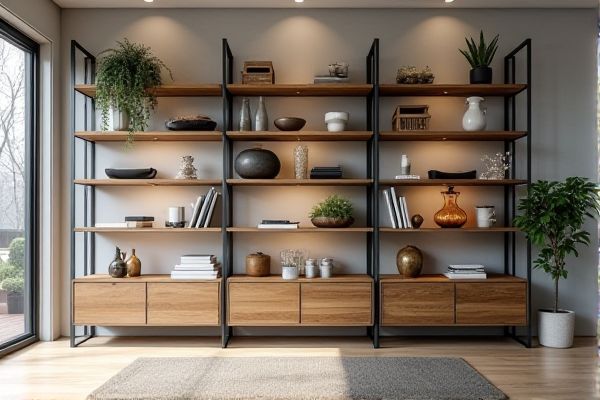
Resin shelving offers lightweight durability and resistance to moisture and rust, making it ideal for humid or outdoor environments, while metal shelving provides exceptional strength and load-bearing capacity suited for heavy items and industrial use. Explore the rest of the article to determine which shelving option best fits your storage needs and space.
Table of Comparison
| Feature | Resin Shelving | Metal Shelving |
|---|---|---|
| Material | Durable plastic resin | Steel or aluminum |
| Weight Capacity | Moderate (150-300 lbs per shelf) | High (up to 1000 lbs per shelf) |
| Rust & Corrosion Resistance | Highly resistant | Prone unless coated or stainless steel |
| Maintenance | Low, easy to clean | Moderate, requires anti-rust treatment |
| Assembly | Tool-free or simple snap fit | Often requires tools and hardware |
| Cost | Generally affordable | Higher cost depending on gauge and coating |
| Suitable Environments | Indoor, damp or humid areas | Industrial, heavy-duty storage |
| Lifespan | Moderate (5-10 years) | Long-lasting (10+ years) |
Introduction to Resin and Metal Shelving
Resin shelving offers lightweight, corrosion-resistant storage solutions ideal for damp environments, while metal shelving provides superior strength and durability suited for heavy-duty industrial use. Resin shelves typically feature UV-stabilized polypropylene, ensuring long-term resistance to chemicals and moisture. Metal shelving, often constructed from steel or aluminum with powder-coated finishes, excels in load-bearing capacity and structural stability.
Material Composition and Durability
Resin shelving is crafted from high-density polyethylene or polypropylene, making it resistant to rust, corrosion, and moisture, ideal for humid or wet environments. Metal shelving, typically made from steel or aluminum, offers superior load-bearing capacity and structural strength but may require protective coatings to prevent rust in damp conditions. Your choice depends on whether you prioritize lightweight, corrosion-resistant storage or maximum durability and heavy-duty support.
Weight Capacity Comparison
Resin shelving typically supports lighter to moderate weight loads, generally around 100 to 200 pounds per shelf, making it ideal for household and light industrial use. Metal shelving offers significantly higher weight capacity, often exceeding 800 to 1,000 pounds per shelf, which suits heavy-duty storage in warehouses and commercial environments. The difference in weight capacity is due to the inherent strength and rigidity of metals like steel or aluminum compared to plastic resin materials.
Assembly and Installation Differences
Resin shelving offers a lightweight design that allows for quick, tool-free assembly, making it an ideal choice for easy installation in your space. Metal shelving requires more robust assembly with bolts and screws, often necessitating tools and extra time for secure installation. Choosing resin shelving can save you time and hassle, while metal shelving provides greater durability for heavy-duty use.
Cost Analysis: Resin vs Metal
Resin shelving typically offers a lower upfront cost compared to metal shelving, making it an economical choice for budget-conscious buyers. Resin shelves are lightweight and resistant to corrosion, potentially reducing long-term maintenance expenses, while metal shelving, although generally more expensive initially, provides superior durability and load-bearing capacity ideal for heavy-duty storage needs. When evaluating your storage solution, consider both the initial investment and the expected lifespan to determine which material offers the best value for your specific requirements.
Aesthetics and Design Options
Resin shelving offers a sleek, modern look with a variety of color options and finishes that can complement contemporary or casual interiors, enhancing your space's overall aesthetic appeal. Metal shelving provides a more industrial and minimalist design, often available in matte or glossy finishes, suitable for modern, rustic, or utilitarian themes. Your choice depends on whether you prioritize the vibrant, versatile design flexibility of resin or the sturdy, streamlined elegance of metal.
Maintenance and Cleaning Requirements
Resin shelving requires minimal maintenance due to its resistance to rust, corrosion, and moisture, making it ideal for damp or humid environments. Metal shelving demands regular cleaning and periodic inspection for rust or corrosion, especially in high-humidity areas, to preserve structural integrity and appearance. Both types benefit from routine dusting, but resin shelves typically need less intensive upkeep to remain functional and attractive.
Resistance to Moisture and Corrosion
Resin shelving offers superior resistance to moisture and corrosion, making it ideal for environments with high humidity or exposure to water, such as basements or garages. Metal shelving, while strong, often requires protective coatings to prevent rust and corrosion over time, especially in damp conditions. You can rely on resin shelves to maintain durability and structural integrity without the need for frequent maintenance or treatment.
Ideal Applications and Environments
Resin shelving is ideal for environments exposed to moisture, chemicals, or outdoor conditions due to its corrosion resistance and lightweight durability. Metal shelving, often made from steel, is best suited for heavy-duty applications requiring high load capacity, such as industrial warehouses and garages. Your choice depends on the specific environmental factors and load requirements of your storage space.
Conclusion: Choosing the Right Shelving Solution
Resin shelving offers corrosion resistance, lightweight durability, and moisture tolerance, making it ideal for environments like garages, basements, and outdoor storage. Metal shelving provides superior strength, load-bearing capacity, and longevity, suited for heavy-duty industrial or warehouse applications. Selecting the right shelving depends on factors such as weight requirements, exposure to humidity, and maintenance preferences.
 homyna.com
homyna.com